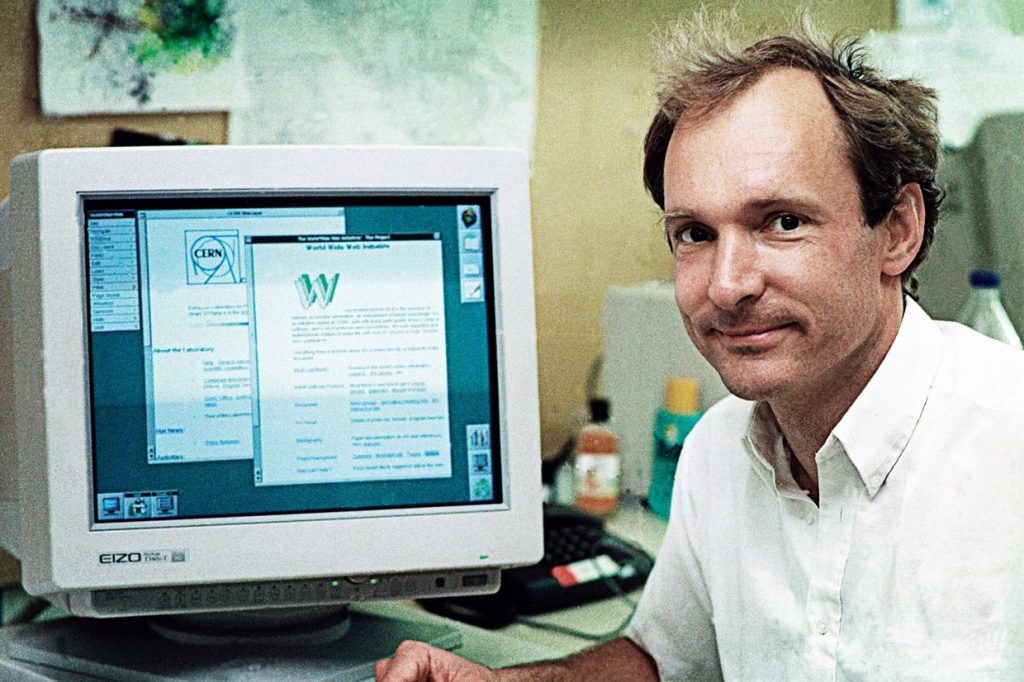
To listen to this reflection as a podcast, click here.
For most people, the name Tim Berners-Lee doesn’t ring a bell.
But what he accomplished 33 years ago will almost certainly impact every day of your life this summer.
The British software consultant (who is now known as Sir Tim Berners-Lee) singlehandedly dreamed up the World Wide Web.
No, he didn’t invent the Internet. That was the product of many hands over many years (and yes, it did include the earnest efforts of then-Senator Al Gore). Berners-Lee was looking for a way not just to link computers, but to help people access a whole world of information.
Early in the 1980s he was puzzled as to how he could do a better job of organizing his personal notes. Then he had a brainstorm: What if he could use the Internet as an information-sharing platform for multiple computer systems?
Between 1989 and 1990 he introduced the first web server; invented the first browser; created the Hyper Text Transfer Protocol (HTTP, a way for computers to access Web pages); conjured up the URL (Uniform Resource Locator) system that gave every Web page its unique “address;” and presented the first version of the Hyper Text Markup Language (HTML).
Other than that, he was a total slouch.
“It was really not a whole lot of work,” he remembers, with what most of us would say is mind-bending modesty.
Of course, his dream of coordinating all the information on the planet wasn’t of much value if others didn’t know he had invented a system that made such a thing possible.
He needed a name. A really compelling name.
He considered The Mesh. But that sounded a bit like “The Mess.” Then he thought of The Information Mine. But people would no doubt start calling it TIM, which might imply that he was on a raging ego trip. “Having people talk about finding it on the TIM would be awful.”
Ultimately he settled on the World Wide Web.
His friends thought it was all a very cute idea. They also assured him it would never catch on.
Who could foresee that in September 2014 the number of global websites would surpass one billion, and that by November 2022 the total would exceed two billion? It’s interesting to note that approximately 83% of all sites are currently dormant (that is, not actively maintained and visited). A number of those are “parked domains,” essentially placeholders for particular addresses.
Nevertheless, something like three new websites are built every second. Berners-Lee could never have imagined such growth.
Of course, it’s not always easy being a creative genius. He once received an indignant call from someone who was offended by his outrageous claims. They seriously doubted that he had “written all that stuff” by himself.
At least he’s unbelievably rich, right? That’s perhaps the most amazing thing about Sir Tim.
From the earliest days of the Web, he renounced all patent rights. Because he wanted this new means of exploration and information-sharing to grow, he insisted that it be open source – available to everyone. Patenting, he says, “would have scuppered the whole thing. It would never have taken off.”
Either Tim Berners-Lee or the world was going to be profoundly blessed. He decided to vote for the rest of the world.
When the apostle Paul was bidding farewell to the young church he had established in the ancient city of Ephesus, he made this memorable remark: “In everything I did, I showed you that by this kind of hard work we must help the weak, remembering the words the Lord Jesus himself said: ‘It is more blessed to give than to receive’ ” (Acts 20:35).
Those words are a big deal for two reasons. First, “It is more blessed to give than to receive” is the only time Jesus is directly quoted outside the four Gospels (Matthew, Mark, Luke, and John). Apparently that statement was so well-known among the earliest Christians that Paul could quote it as a generally accepted rule for life.
Second, it’s always been counterintuitive. It flies in the face of common sense. Why would it be better for me to give something than to get something?
The key, of course, is the word “blessed.” Something wonderful happens whenever we choose to imitate God.
God is a God who gives. Whenever we struggle to hang on to something, wrapping our hands around it as if our life depended on it, we actually become smaller. Weaker. Less able to receive the good things God is eager to share with us. But whenever we open our hands and pass along God’s treasures, our capacity to experience joy – and to help others experience joy – grows exponentially.
Your best stuff, your best ideas, and your best hopes are all gifts from God that currently happen to be in your hands – because they are on their way to somebody else.
And you don’t have to do a Web search to find out that is hands down the richest way to live.
